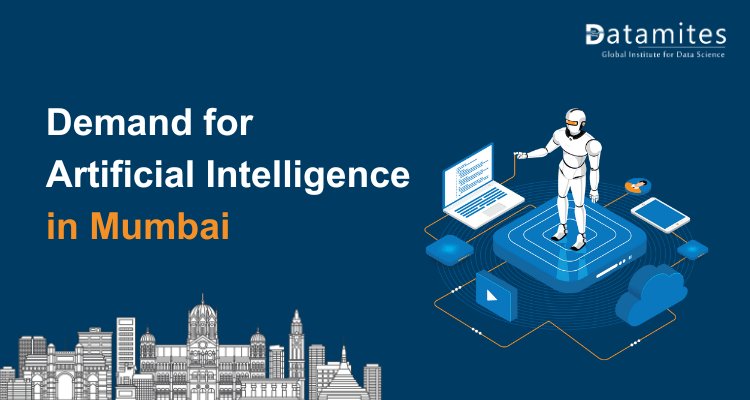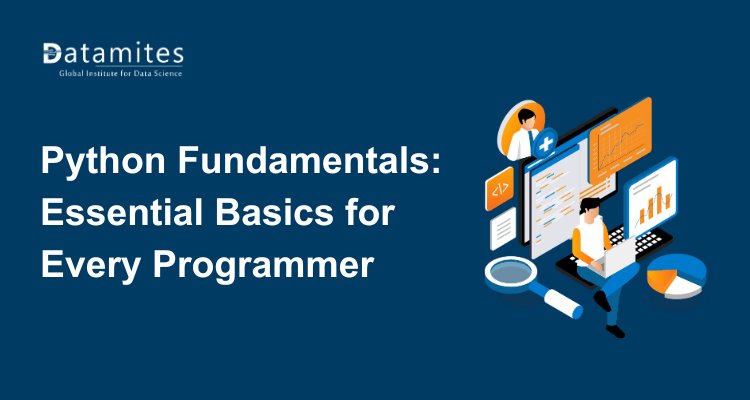Data Engineer Salary in India
A data engineer in India plays a crucial role in managing and optimizing data infrastructure. Salaries vary based on experience, skills, and location, reflecting the growing demand for data expertise.
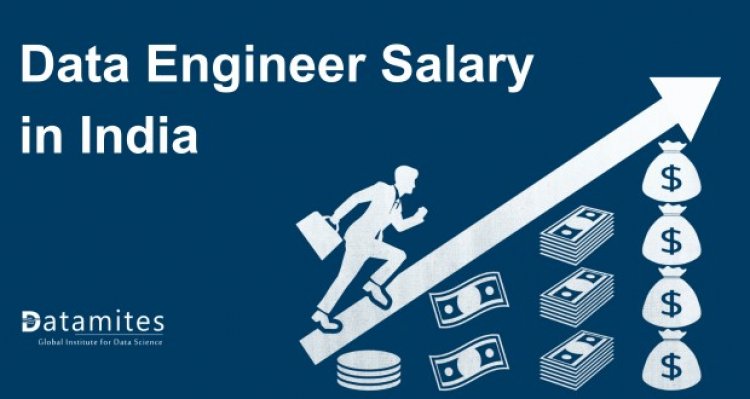
In the dynamic realm of technology, data engineering emerges as a pivotal force. This article delves into the fascinating world of data engineers in India, unraveling the mysteries of their earnings. We’ll explore how these tech wizards, who architect the backbone of our digital universe, are compensated. From fresh graduates to seasoned experts, we’ll uncover what drives their paychecks in this fast-evolving field.
Join us as we journey through the vibrant landscape of data engineering salaries in India, where numbers tell not just data stories, but tales of talent and treasure.
Who is a Data Engineer?
Data Engineers are pivotal in the big data arena, tasked with crafting and maintaining robust data architectures to manage vast information volumes. Their expertise lies in designing, building, testing, and upholding comprehensive systems like databases and large-scale processing frameworks, ensuring efficient data storage and organization.
The significance of data engineers is underscored by the burgeoning global big data and data engineering services market, which is projected to surge from $39.50 billion in 2020 to $87.37 billion by 2025, growing at a compound annual growth rate of 17.6%, according to MarketDataForecast. This growth reflects the escalating demand for their skills in managing and optimizing data flow.
In their role, Data Engineers not only construct the infrastructure but also develop and manage data pipelines essential for data transformation and transportation. They navigate through the complexities of data ingestion, processing, and distribution, ensuring data integrity, accessibility, and security. Their work is integral to enabling businesses to fully leverage data for insightful decision-making and fostering innovative solutions. By handling the intricacies of big data, Certified Data Engineers Course play a key role in empowering individuals to capitalize on data-driven opportunities.
Refer the below articles:
- Difference Between Data Scientist and Data Engineer
- Data Engineer vs Data Analyst
- Difference Between Data Science and Data Analytics
Data Engineer – Market Demand and Career Prospects in India
Data engineers are pivotal in enabling companies to make strategic, data-driven decisions. Their work in managing, processing, and analyzing data helps businesses gain insights and maintain a competitive edge.
Data Engineering Job Roles in India:
- Data Engineer: Responsible for a broad spectrum of data-driven tasks, ideal for those starting in the field or transitioning into data engineering.
- Warehouse-Centric Data Engineer: Specializes in the creation and management of data warehouses, focusing on big data storage and retrieval.
- Pipeline-Centric Data Engineer: Concentrates on developing and maintaining the flow of data through pipelines, ensuring efficient data transfer from sources to storage systems like data warehouses.
- Database Administrator (DBA): Oversees the operation and maintenance of database systems, with a focus on ensuring data integrity, security, and performance.
- Business Intelligence (BI) Developer: Utilizes data to generate insights and support business decision-making, often involving data visualization and reporting tools.
- Machine Learning Engineer: Integrates machine learning algorithms into data pipelines, optimizing data preparation for model training and deployment.
- Data Architect: Designs and constructs the overall data framework, including databases, data warehouses, and data lakes, ensuring scalability and efficiency.
- ETL Developer: Specializes in the Extract, Transform, Load (ETL) process, crucial for data integration and migration between different systems.
- Cloud Data Engineer: Focuses on cloud-based data solutions, managing data storage and processing in cloud environments such as AWS, Google Cloud, or Azure.
- Data Governance Specialist: Ensures compliance with data policies and regulations, maintaining data quality and overseeing data privacy and security measures.
Data Engineers in India receive handsome compensation, with salaries reflecting their crucial role in the data-driven economy. The remuneration is commensurate with their skills, experience, and the vital role they play in harnessing data for strategic business growth.
Read these below articles:
- Data Analyst Salary in India
- Artificial Intelligence Engineer Salary in India
- Data Scientist Salary in India: Factors That Matter
Data Engineer Salary Range in India
The salary for a data engineer in India is influenced by various factors, leading to significant variations in compensation. Key elements affecting their earnings include their experience level, geographic location within the country, educational background, industry sector, and possession of unique skills or certifications.
According to Glassdoor, the average annual Data Engineer Salary in India stands at INR ₹9,00,000. However, it’s crucial to note that this figure is a general benchmark, and actual salaries can vary widely from this average. The range of compensation spans from the lower to the higher end, depending on the aforementioned factors.
This salary range not only reflects the diverse qualifications and experience levels of Data Engineers but also underscores the dynamic nature of their role in the Indian job market. The varied opportunities in this field mean that Data Engineers with specialized skills or experience in high-demand areas can command significantly higher salaries, illustrating the profession’s adaptability and growth potential in India’s evolving technological landscape.
A) Data Engineer Salary Based on Experience
The salary of data engineers in India varies significantly with experience. For freshers, those just entering the field, salaries generally start from a modest base. As they accumulate experience, their compensation sees a notable increase.
- Freshers (0-1 years of experience): Entry-level data engineers typically begin with a salary reflective of their early career stage. During this phase focused on acquiring practical experience and industry insights, those with less than 1 year of experience can anticipate an average total compensation of INR ₹518,398. ( Payscale).
- Early Career (1-4 years of experience): As data engineers accumulate a few years of experience, their salaries ascend, reflecting heightened proficiency in managing data-centric projects. An early career Data Engineer with 1-4 years’ experience garners an average total compensation of INR ₹748,122, showcasing the value placed on their growing expertise (Payscale).
- Mid-Career (5-9 years): With a well-established skill set and considerable experience, data engineers at this stage command a more substantial salary. Often entrusted with intricate projects or leadership responsibilities, a mid-career Data Engineer with 5-9 years of experience earns an average total compensation of INR ₹14,47,428 (Payscale).
- Experienced Professionals (10+ years): Data engineers with extensive experience earn top-tier salaries, underscoring their immense value in the industry. Armed with deep expertise, often complemented by specialized skills or certifications, they command high compensation. An experienced Data Engineer with 10-19 years of experience averages a total compensation of INR ₹20,60,998 (Payscale).
This progression highlights the direct correlation between experience and earning potential in the field of data engineering in India.
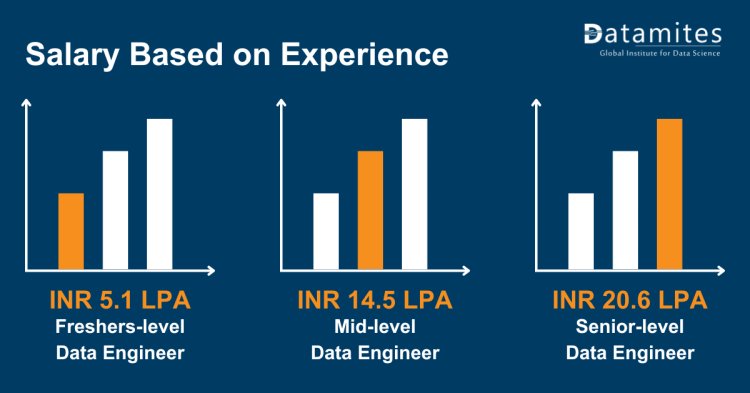
B) Geographical Variations in Salary
The data engineers salary in India are influenced significantly by geographical location, with certain cities offering higher pay due to various factors like the presence of major tech companies, cost of living, and local demand for skilled professionals. Here’s a comparison of how salaries vary across key Indian cities:
Bangalore, India’s Silicon Valley, stands out for offering some of the highest salaries for Data Engineers, primarily due to its plethora of tech companies and startups. The average data engineer salary in Bangalore is ₹11,87,500 per year, reflecting the city’s leading position in the tech industry.
Mumbai, known as India’s financial hub, also offers competitive salaries for Data Engineers in Mumbai, particularly in finance and tech firms. The average annual salary in Mumbai is INR ₹8,19,099, showcasing its status as a major economic center.
Pune, With its expanding IT and automotive sectors, Data Engineers who have completed the data engineer training in Pune can expect attractive salaries. The average data engineer salary in Pune is INR ₹8,10,060 per year, indicative of its growing IT landscape.
Hyderabad’s thriving tech scene ensures competitive salaries for Data Engineers, often rivaling those in Bangalore. The average data engineer salary in Hyderabad is INR ₹10,48,972 per year, demonstrating its robust position in the technology sector.
Gurgaon and Noida, integral to India’s National Capital Region, are known for high salaries for Data Engineers, courtesy of numerous multinational corporations and IT companies. The average data engineer salary in Gurgaon of INR ₹11,02,987 per year, while average data engineer salary in Noida provides an average of INR ₹9,89,009, reflecting their status as key corporate hubs.
Chennai, a long-established IT center, presents good salary prospects for Data Engineers, albeit slightly lower than cities like Bangalore or Hyderabad. The average data engineer salary in Chennai here is INR ₹7,69,539 per year, marking its steady presence in the IT industry.
Chandigarh, though not traditionally recognized as a tech city, is seeing a rise in salaries with its growing IT sector. The average salary for a Data Engineer in Chandigarh is INR ₹8,47,540 per year, indicating its emerging role in the tech domain.
Delhi, India’s capital, offers respectable salaries for Data Engineers, with the average data engineer salary in Delhi standing at INR ₹9,44,075 per year. Salaries in Delhi vary widely, influenced by the company and specific roles, showcasing the diversity of its job market.
In Kolkata, often known for its rich culture and historical significance, the average salary for Data Engineers in Kolkata stands at ₹6,80,622 per year. This relatively lower salary scale is reflective of the city’s more affordable cost of living and a comparatively smaller tech industry presence.
Kochi, on the other hand, is rapidly carving out a name for itself as a budding hub for technology professionals. Referred to as the ‘Queen of the Arabian Sea,’ Kochi has seen significant growth in the IT sector, notably with developments like the Kochi-Metro area and the Infopark. This progress is mirrored in the average salary for a Data Engineer in Kochi, which is INR ₹9,07,377 per year, indicating the city’s rising potential in the tech landscape.
Overall, cities like Bangalore, Mumbai, and Hyderabad often lead in terms of salary offerings for data engineers, while other cities like Kolkata and Chandigarh tend to offer lower salary ranges. This disparity is a reflection of the varying economic dynamics and industry concentrations across these cities.
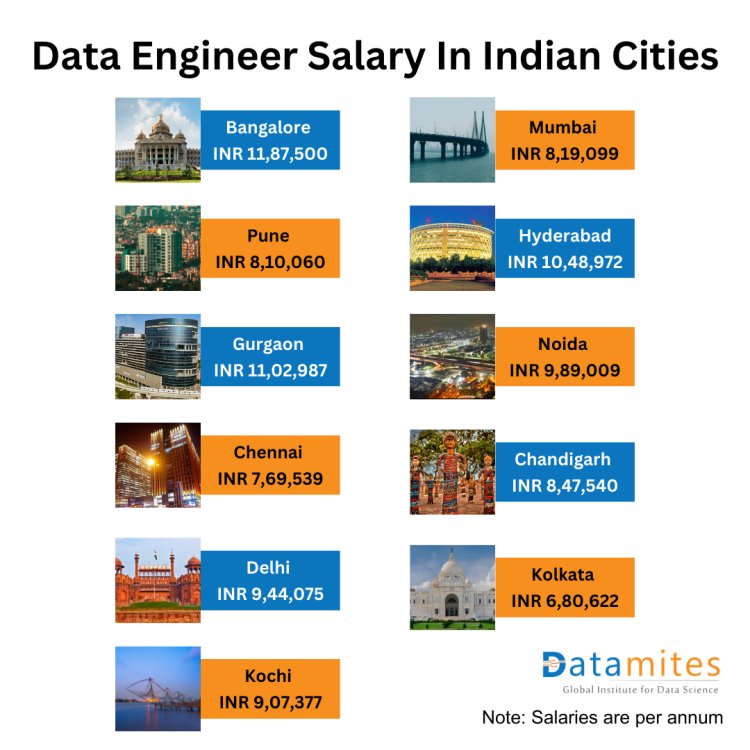
C) Data Engineer Skills That Boost Salary
Possessing specific data engineer skills can significantly boost the salaries of data engineers in India. Proficiency in SQL is fundamental, as it’s the cornerstone of database management and manipulation. Mastery in programming languages like Python or Java is highly valued for their versatility in handling data engineering tasks. Expertise in big data technologies such as Hadoop, Spark, and Kafka is increasingly sought after, given the growing focus on handling large datasets efficiently.
Additionally, data warehousing skills, including knowledge of platforms like AWS Redshift or Google BigQuery, are crucial for managing and analyzing large volumes of data. These skills not only enhance a data engineer’s marketability but also command higher salaries due to their critical role in data-driven decision-making processes.
In addition to technical proficiencies, certain soft skills are essential for Data Engineers in India, enhancing their marketability and potential for higher salaries.
- Problem-Solving Ability: Data Engineers often encounter complex data-related challenges. The ability to think analytically and solve problems creatively is invaluable.
- Communication Skills: Effective communication is crucial for explaining technical concepts to non-technical stakeholders and collaborating with team members.
- Attention to Detail: Given the precision required in data engineering, a keen eye for detail ensures accuracy and quality in data handling and analysis.
- Project Management: The ability to manage projects, including planning, execution, and meeting deadlines, is key, especially when leading data engineering initiatives.
- Adaptability: With the fast-evolving tech landscape, being adaptable to new technologies and changes in the industry is critical.
- Teamwork: Data Engineers often work in teams. Being a collaborative team player helps in achieving collective goals effectively.
These soft skills, combined with technical expertise in areas like SQL, Python or Java programming, and knowledge of big data technologies and data warehousing platforms, greatly enhance a Data Engineer’s profile. This combination of skills not only boosts their employability but also positions them to command higher salaries in India’s dynamic job market.
Also refer these below articles:
- How to Become a Data Engineer in India
- How to Become A Data Analyst in India
- How to Become A Data Scientist in India
Bottom Line
India’s Data Engineering market is poised for a 33.8% CAGR, soaring from $25.3 billion in 2023 to $108.7 billion in 2028 (AimResearch). So embarking on a data engineering career in India presents dynamic challenges and lucrative rewards. Salaries, influenced by experience and location, promise growth with expertise. Bengaluru, Mumbai, and Hyderabad lead in compensation, reflecting robust tech sectors. This field not only promises financial benefits but also a chance to be at the forefront of technological innovation, making it an attractive career choice for those passionate about data and technology in India.
DataMites is the global institute for data science and artificial intelligence that provides accredited Data Engineer training in India, recognized by IABAC®Certification. Our comprehensive program ensures you are well-equipped to navigate the complexities of data engineering in today’s dynamic business landscape.
DataMites Training Institute offers a globally recognized Data Engineer Course that equips learners with essential data engineering skills. The course covers Python, Big Data, SQL, Data Wrangling, and Pandas, providing hands-on training for practical applications. Accredited by IABAC, it offers industry-recognized certification to boost career growth. With expert guidance and job support, DataMites prepares professionals for success in the data-driven world.


